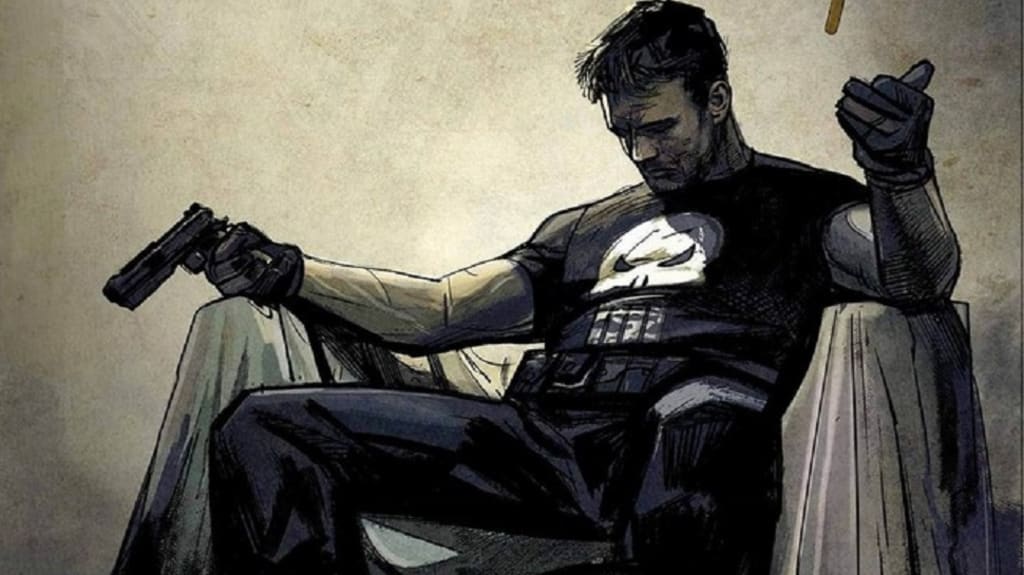
Spider-Man may be the world's most marketed superhero, but there's no denying The Punisher's subtle-yet-pervasive presence across our cultural landscape. Comic book writer Nathan Edmondson — who briefly penned an excellent Punisher series — observed:
"The Punisher is perhaps the most ubiquitous comic character, world-wide. Soldiers wear him on their uniforms who haven’t read a comic in their lives; sex toys are nicknamed for him, racecars and wrestlers take on the skull or namesake, despite having little awareness of the actual comic... I have always liked The Punisher, the simplicity of the uncompromising death dealer; even his costume is simple, no-nonsense, fierce."
Edmonson is right — in cultural terms, the Punisher exerts a powerful force. There's something undeniably iconic about this "uncompromising death dealer," something that rings truer to human nature than many other aspect of superhero comics. As we look forward to 2017, which will give Jon Bernthal's Punisher the leading role in his own series, it's time to ask: Why is he so popular?
Vengeance Versus Retributive Justice
To understand the Punisher's significance, you have to look back through the mists of time — back before even the Bible was written. In those ancient times, there was no limit to the concept of justice. If you were wronged, then you sought vengeance. The Old Testament switched this up, imposing a structure of retributive justice upon the human impulse for revenge; "an eye for an eye" established the precedent that the punishment should not exceed the crime. But the very fact that this had to be established in religious law gives an idea of just how powerful the human impulse for vengeance is.
The Punisher represents the idea of vengeance taken to its ultimate extreme. Frank Castle has but one response to crime: death. You deal drugs? You die. You rape? You die. You steal? You die. (In the 1970s, Marvel briefly riffed on this in a back-issue of Amazing Spider-Man, with a version of the Punisher trying to kill a jaywalker.)
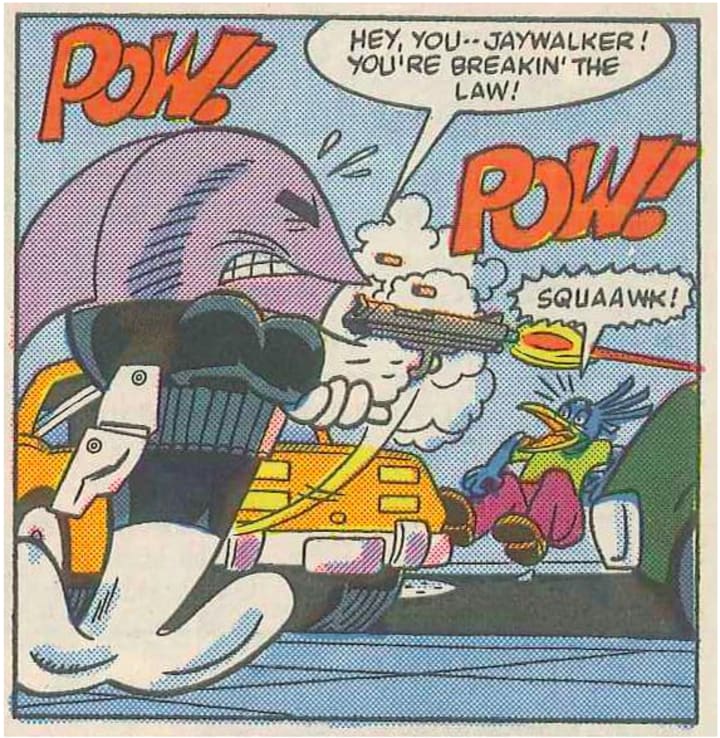
[Credit: Marvel Comics]
The attraction of this "uncompromising death dealer" is that the Punisher responds to crime on a very personal level. His motivation is a simple one: He lost his family due to crime, and now all crime is a personal affront to him. Thus, every time the Punisher kills, he's representing a sense of moral outrage at the evil of the universe. In a world where justice often seems distant — where the courts and judges often seem to ignore the pain criminals have caused with their crimes, and where the scales of justice seem imbalanced — the Punisher's moral anger is a very attractive response.
Not Being A Victim
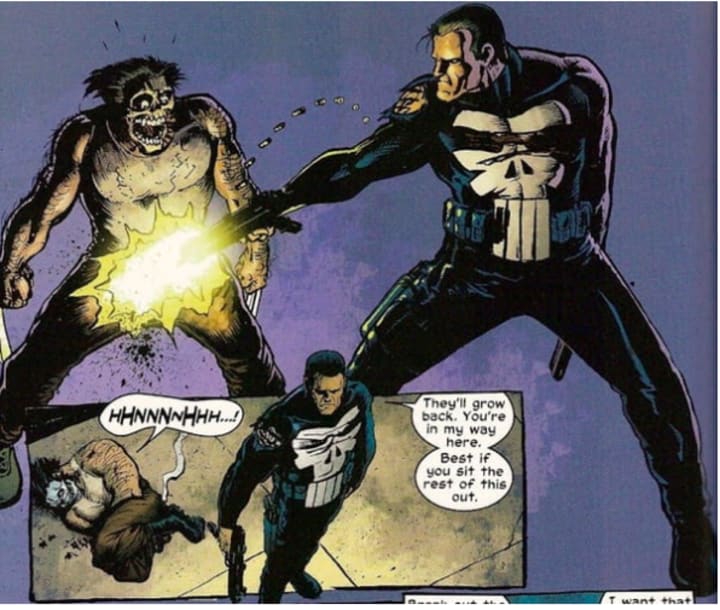
How the Punisher handled Wolverine. [Credit: Marvel Comics]
Part of the issue is that society has become progressively more complex, and the legal systems that underpin the courts are incomprehensible to most of us. Skilful lawyers can manipulate such systems to their own ends, and the wealthy can escape justice's reach; where they can't manipulate their way out, they pay their accusers off, limiting the damage to their reputations they would suffer from a court case or a guilty verdict.
In this increasingly complex world, people can easily be reduced to victims. We sense that the world is beyond our control, that our lives are dictated by impersonal structures and legal systems. Where crimes are conducted against us, the law discounts our anger and pain, and many feel as though the guilty are treated with more respect than the innocent.
The Punisher should be set against this. Resolving not to be a victim, the Punisher takes control of his life; he first slaughters all those who were responsible for the loss of his family, and then stands on the side of the victims, brutally taking the law into his own hands. In that sense, the Punisher is the ultimate extension of our desire for control; he rails against the impersonal systems that control our lives, and in doing so he earns their wrath. But — significantly — he always comes out on top!
The Paradox Of The Punisher
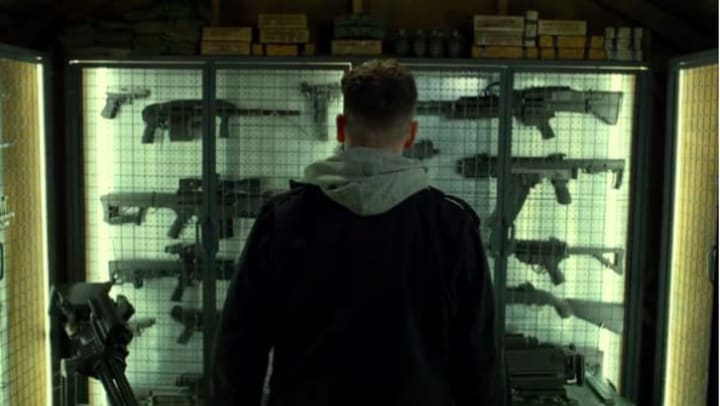
The Punisher's arsenal in 'Daredevil' Season 2. [Credit: Netflix]
Like all the best characters of fiction, though, there is more to the Punisher than meets the eye; there is a sense of paradox, of conflict within his character. That's why Daredevil Season 2 works so well; it showcases that paradox, making it explicit in the court scenes.
Think about it. The loyal soldier who killed for his country becomes a vigilante killer hunted by his country. The family man becomes the lone assassin. The man who burned with zealous patriotism becomes a criminal whose name is vilified by the press. These are all paradoxes, and they make the Punisher more than just an "uncompromising death dealer"; they turn him into a three-dimensional person, a man whose past and present are in conflict, and who therefore becomes fascinatingly relatable.
Ultimately, the Punisher represents a powerful archetype — but he's also a wonderfully well-developed character. As such, he appeals to us on both a visceral level and on a narrative level. The catch, of course, is that only the best scripts can balance those two factors out. I genuinely view Netflix's Punisher series as the most risky #MarvelNetflix show we'll see so far; but if it goes well, it could add something wonderful to the wider tapestry of the #MCU.

Credit: Netflix
(Source: Comicvine)
About the Creator
Tom Bacon
A prolific writer and film fan, Tom has a deep love of the superhero genre.


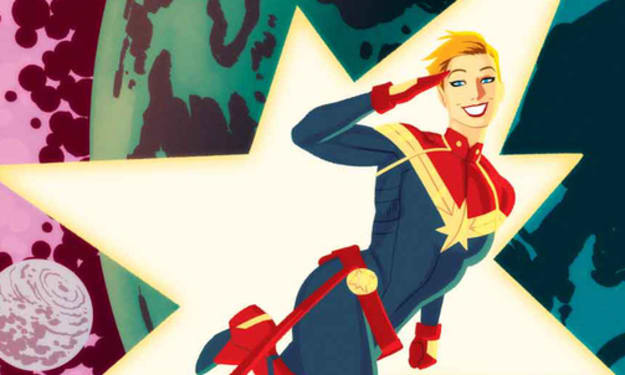



Comments
There are no comments for this story
Be the first to respond and start the conversation.